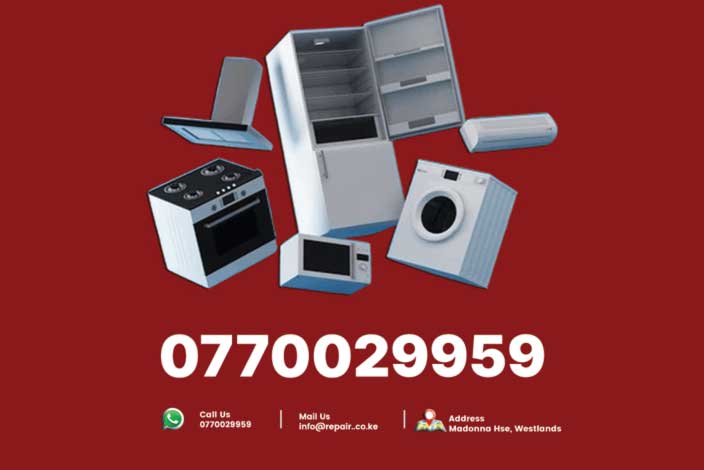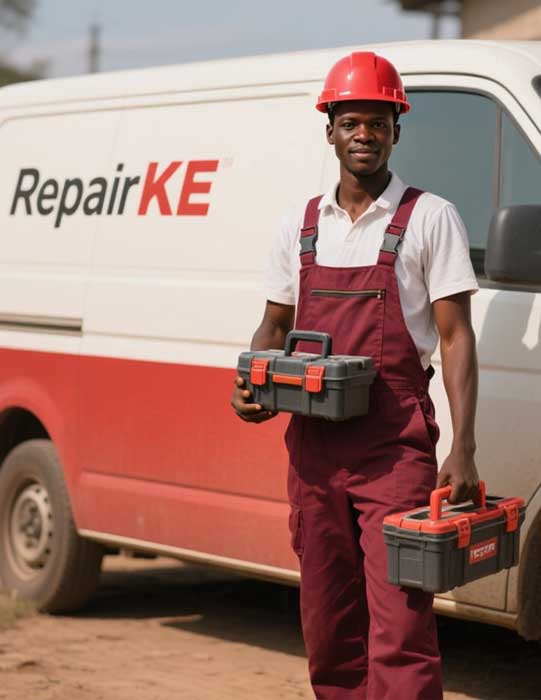How Do I Maintain My Washing Machine to Avoid Repairs in Nairobi?
Maintaining your washing machine is essential to ensure its longevity and prevent costly repairs, especially in a bustling city like Nairobi, where reliable appliance performance is key to managing daily chores. By adopting a proactive maintenance routine, you can keep your washing machine running smoothly and avoid unexpected breakdowns. Below, we address the frequently asked question from Repair.co.ke—"How do I maintain my washing machine to avoid repairs in Nairobi?"—with practical tips tailored for Nairobi residents.
Why Regular Maintenance Matters
Washing machines endure significant wear and tear from frequent use, handling heavy loads, and operating in diverse environmental conditions. In Nairobi, factors like hard water, dust, and power fluctuations can further strain your appliance. Regular maintenance helps:
- Extend the machine’s lifespan: Prevent premature wear of components like the drum, motor, and hoses.
- Reduce repair costs: Catch minor issues before they escalate into major faults.
- Improve efficiency: Ensure optimal performance, saving water, energy, and detergent.
- Maintain hygiene: Prevent mold, mildew, and unpleasant odors that affect your laundry.
Practical Maintenance Tips
Follow these expert-recommended steps to keep your washing machine in top condition, inspired by insights from Repair.co.ke and industry best practices.
1. Clean the Machine Regularly
Dirt, detergent residue, and bacteria can accumulate inside your washing machine, leading to odors and reduced performance. To keep it clean:
- Run a service wash monthly: Use a hot cycle (60°C or higher) with a washing machine cleaner or a mixture of white vinegar and baking soda. This removes residue and kills bacteria. Check your user manual for specific service wash instructions.
- Clean the drum and door seal: Wipe the drum and rubber gasket (especially in front-load machines) with a damp cloth after each use to prevent mold and mildew. Pay attention to the folds of the gasket, where dirt often collects.
- Clear the lint filter: Most washing machines have a lint trap, typically located near the drum or at the bottom of the machine. Clean it every 1–2 months to prevent clogs that can affect drainage and leave fuzz on clothes.
2. Inspect and Maintain Hoses
Hoses are critical for water intake and drainage but can wear out or become clogged, leading to leaks or poor performance.
- Check hoses monthly: Inspect the water inlet and drain hoses for cracks, kinks, or loose connections. In Nairobi, where water quality can vary, sediment buildup in hoses is common, so ensure they’re clear.
- Replace hoses every 3–5 years: Even if they appear fine, hoses can weaken over time, risking leaks that could damage your home. Consider professional replacement if you’re unsure how to do this safely.
- Ensure proper drainage: Verify that the drain hose has a small gap where it enters the drain to prevent pressure buildup. Some Nairobi homes may require a drain vent per local plumbing codes—consult a technician if needed.
3. Use the Right Detergent and Load Size
Incorrect detergent use and overloading are common causes of washing machine issues.
- Use the recommended detergent: Follow the manufacturer’s guidelines for detergent type and quantity. In Nairobi, where hard water is prevalent in some areas, consider using a detergent formulated for hard water to reduce residue buildup.
- Avoid overloading: Overloading strains the motor, drum, and bearings, leading to excessive vibration and potential breakdowns. Check your machine’s capacity (e.g., 7kg or 10kg) and load accordingly.
- Balance the load: Distribute clothes evenly to prevent an unbalanced drum, which can cause noise and wear out shock absorbers.
4. Address Power and Electrical Concerns
Nairobi’s occasional power surges and fluctuations can damage your washing machine’s electronic components.
- Use a surge protector: Install a surge protector to safeguard the machine’s control board and motor from voltage spikes.
- Check the power supply: Ensure the machine is plugged into a stable, properly grounded outlet. If the machine doesn’t start, verify that the circuit breaker hasn’t tripped.
- Unplug when not in use: During prolonged outages or when the machine is idle for extended periods, unplug it to protect against sudden power surges.
5. Keep the Machine Level and Stable
An uneven washing machine can vibrate excessively, damaging internal components like the drum and shock absorbers.
- Check the level monthly: Use a spirit level to ensure the machine is balanced. Adjust the feet if necessary, especially if you’ve recently moved the machine or live in an area with uneven flooring.
- Place on a stable surface: In Nairobi homes, ensure the machine is on a flat, sturdy surface to minimize movement during spin cycles.
6. Schedule Professional Maintenance
While DIY maintenance is effective, professional servicing can catch issues that go unnoticed.
- Book annual checkups: Contact a trusted Nairobi-based repair service like Repair.co.ke (contact: 0770029959) for a thorough inspection. Technicians can clean internal components, lubricate moving parts, and replace worn parts like belts or bearings.
- Address minor issues promptly: If you notice unusual noises, leaks, or poor performance, don’t delay. Early intervention prevents costly repairs.
7. Combat Nairobi-Specific Challenges
Nairobi’s unique environmental factors require tailored care:
- Hard water management: Hard water can cause limescale buildup, affecting the heating element and drum. Install a water softener if possible, or use a descaling agent during service washes.
- Dust control: Dust from Nairobi’s dry seasons can clog vents and filters. Keep the machine in a well-ventilated, dust-free area and clean external vents regularly.
- Odor prevention: High humidity in some Nairobi neighborhoods can encourage mold growth. Leave the door open after each wash to allow air circulation and dry the drum.
Common Issues and Quick Fixes
Here are solutions to frequent washing machine problems, as highlighted by Repair.co.ke:
- Machine won’t start: Check the power supply, ensure the door latch is secure, and verify the control panel is responsive. If unresolved, call a technician.
- Water not draining: Clean the drain pump and filter, and check for blockages in the drain hose.
- Excessive noise or vibration: Balance the load, ensure the machine is level, and tighten any loose parts like screws or bolts.
- Leaks: Inspect the door seal and hoses for damage or loose connections. Tighten or replace as needed.
- Foul odors: Run a service wash and clean the door seal and standpipe to eliminate bacteria and grime.
Why Choose Professional Services in Nairobi?
For complex issues or annual maintenance, rely on reputable Nairobi repair services like Repair.co.ke. They offer:
- Experienced technicians: Skilled in handling all brands, including LG, Samsung, Bosch, and Whirlpool.
- Same-day service: Quick response times to minimize disruptions.
- Genuine spare parts: Ensuring durable repairs with warranties.
- Wide coverage: Serving neighborhoods like Westlands, Karen, Lavington, and Ruaka.
Maintaining your washing machine in Nairobi requires a combination of regular cleaning, careful use, and professional servicing to address local challenges like hard water and power fluctuations. By following these tips from [Repair.co.ke](เกิดข้อผิดพลาด: URL ไม่ถูกต้อง) and scheduling periodic maintenance, you can avoid repairs, save money, and keep your laundry routine seamless. For expert assistance, contact Repair.co.ke at 0770029959 to book a technician or inquire about maintenance services. Keep your washing machine in top shape and enjoy hassle-free laundry for years to come!
Disclaimer: Always consult your washing machine’s user manual for model-specific instructions and safety guidelines. For complex repairs, trust certified professionals to avoid voiding warranties or causing further damage.






